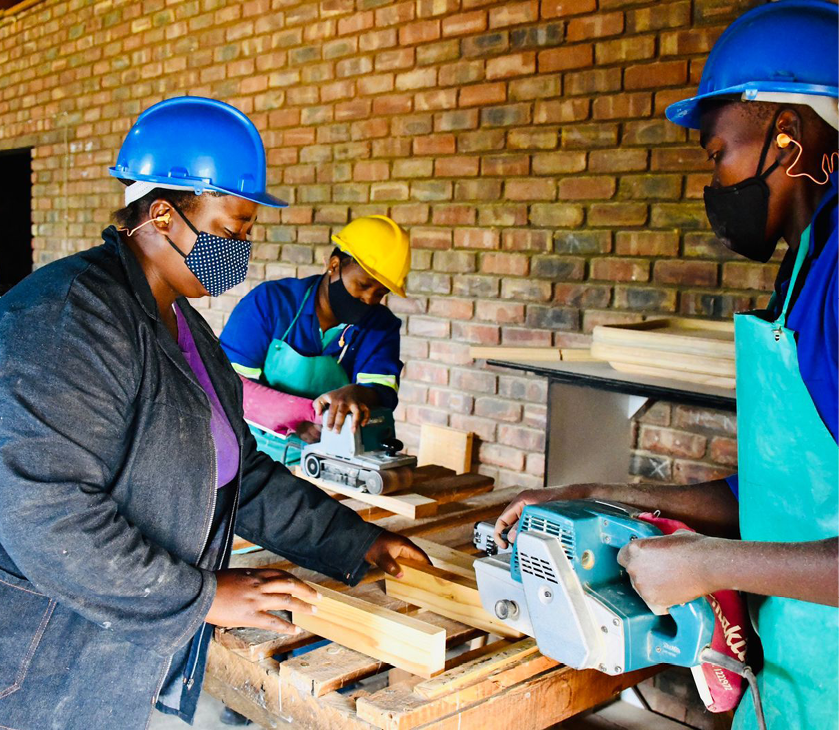Carpentry experts are hammering out a stable future for themselves and their communities.
 Young people from Vhulaudzi Tshitavha village in Makhado, Limpopo, are crafting a brighter future for themselves by making furniture.
Young people from Vhulaudzi Tshitavha village in Makhado, Limpopo, are crafting a brighter future for themselves by making furniture.
They have formed the Limpuma Furniture Cooperative, which makes a range of furniture, including beds, chairs, coffee tables, kitchen units, podiums, benches and school desks, as well as coffins and jungle gyms.
Chairperson Mpho Neluheni (33) says the cooperative supplies local furniture shops, sells directly to members of the public and also custom make individual pieces. Their favoured wood is pine and oak.
The cooperative is planning to expand its operations after building a new workshop that will replace the old community centre they have been using since they started operations in 2015.
Plans to expand
With the ramp-up in production as a result of the new workshop, Limpuma Furniture Cooperative plans to open at least two retail shops in the next seven years.
“As part of growing the business, every month-end we go sell our products in the town of Makhado. We are also in the process of negotiating with various additional stores to start selling our products,” says Neluheni.
Phumzile Mashego (28), a member of the cooperative, says that the business helped her send her child to a better school and support her mother.
She recalls that before joining the cooperative, she was unemployed.
Mashego met the other founding members of the cooperative when they took part in a one-year carpentry learnership offered by state-owned forestry company South African Forestry Companies Limited (SAFCOL).
After the learnership ended, some of the participants were approached by SAFCOL and helped to start their own company, which gave rise to the cooperative.
It cost about R300 000 to start the cooperative and it benefited from funding of R500 000 from the Department of Social Development.
Members of the cooperative also received business development training and assistance with quality and operational management through the Small Enterprise Development Agency.
The cooperative’s current annual profit is R500 000.
Ambani Ndou (28), a Limpuma Furniture Cooperative intern, has big dreams after gaining skills during his time at the cooperative.
“Now I am able to make various pieces of furniture. After completing my internship here, I am planning to open my own workshop,” he says.
Local businesses are also benefiting from having the Limpuma Furniture Cooperative in their backyard. They are able to source furniture and coffins closer to home, saving them on transportation costs.
SAFCOL upskills communities
SAFCOL’s learnership programmes help ensure that skilled individuals are available to the sector in the future, while also addressing poverty and unemployment, especially in the communities surrounding its areas of operation.
The learnerships mainly benefit previously disadvantaged individuals, people living with disability, black females and youth.
In addition to the one-year SAFCOL learnership that members of the Limpuma Furniture Cooperative underwent, the forestry company has helped the cooperative to acquire technical and business skills.
In addition, as part of its ongoing partnership with SAFCOL, the cooperative secured a contract to manufacture school desks that SAFCOL donated to rural schools.
SAFCOL representative Helen Seloane says the company assisted the cooperative to acquire technical and business skills.
“We have offered them the necessary support they needed so they can be able to run the business efficiently,” she says.
Furniture Industry Masterplan
After successfully maximising the opportunities given to it through state programmes, Limpuma Furniture Cooperative is now well positioned to benefit even further from government efforts to grow the economy.
The cooperative and other emerging players in the furniture manufacturing sector will benefit from government’s Furniture Industry Masterplan.
The plan was established to set clear guidelines and targets for the industry and to guide public sector procurement as part of efforts to support and stimulate the industry.
In March, Trade, Industry and Competition Deputy Minister Nomalungelo Gina said the masterplan has the potential to reposition the sector.
“It is one of the most labour-intensive industries, with a potential to contribute to the reduction of unemployment and increase the export and development of small, medium and micro enterprises,” said the Deputy Minister.
The masterplan is centred on three pillars: market access, transformation and the improvement of competitiveness. Its aims is to build a fast-growing, profitable, inclusive and sustainable furniture industry, and increase local production by 50% by the end of 2021.
To find out more about the SAFCOL learnership, call 012 436 6300 or go to www.safcol.co.za



 Facebook
Facebook Twitter
Twitter WhatsApp
WhatsApp